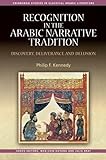Recognition in the Arabic narrative tradition [Texte imprimé] : discovery, deliverance and delusion / Philip F. Kennedy
نوع المادة : نصالسلاسل:Edinburgh studies in classical Arabic literatureتفاصيل النشر:Edinburgh : Edinburgh University Press, cop. 2016وصف:1 vol. (356 p.) ; 25 cmتدمك:
نصالسلاسل:Edinburgh studies in classical Arabic literatureتفاصيل النشر:Edinburgh : Edinburgh University Press, cop. 2016وصف:1 vol. (356 p.) ; 25 cmتدمك:- 978-1-4744-1372-5
- 801.95 23E
- 801.95
| نوع المادة | المكتبة الحالية | المجموعة | رقم الطلب | رقم النسخة | حالة | تاريخ الإستحقاق | الباركود | |
|---|---|---|---|---|---|---|---|---|
|
|
Bibliothèque centrale En accès libre | Collection générale | 801.95 / 587 (إستعراض الرف(يفتح أدناه)) | 1 | المتاح | 000007174322 |
Bibliogr. p. 333-348
A cognitive reading of the Qur'ānic story of Joseph -- Joseph in the Life of Muḥammad : prophecy in Tafsīr (exegesis), Sīrah (biography) and Ḥadīth (tradition) -- Joseph and his avatars -- Intertextuality and reading : the myth of deliverance in al-Faraj ba'd al-Shiddah -- Imposture and allusion in the picaresque maqāmah
"According to Aristotle, a well-crafted recognition scene is one of the basic constituents of a successful narrative. It is the point when hidden facts and identities come to light--in the classic instance, a son discovers in horror that his wife is his mother and his children are his siblings. Aristotle coined the term 'anagnôrisis' for the concept. In this book Philip F. Kennedy shows how 'recognition' is key to an understanding of how one reads values and meaning into, or out of, a story. He analyses texts and motifs fundamental to the Arabic literary tradition in five case studies: the Qur'an; the biography of Muhammad; Joseph in classical and medieval re-tellings; the 'deliverance from adversity' genre and picaresque narratives"--Back cover
لا توجد تعليقات على هذا العنوان.


